APHRODITE RETINUE
Greek Name
Αφροδιτη
Transliteration
Aphroditê
Latin Spelling
Aphrodite
Translation
Venus
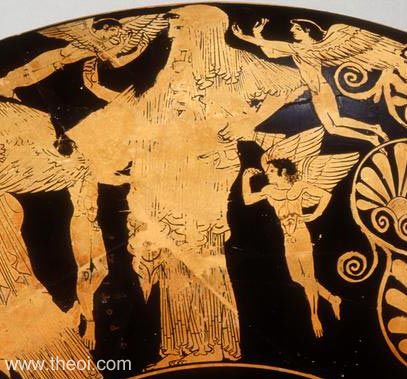
APHRODITE was the Olympian goddess of love, beauty, pleasure and procreation.
This page describes the large retinue of the goddess which included Eros and the Erotes, personifications of love and desire, and the Kharites (Charites), goddesses of grace and beauty, and the Horai, goddesses of the seasons. Her most important companion god was, of course, Eros--her son and inseperapable companion whose figure was used as the goddess' standard attribute in classical art.
In ancient Greek vase painting Aphrodite is often surrounded by a host of obscure goddesses personifying the various pleasures of life.
ATTENDANTS OF APHRODITE
ANTHEIA The goddess of floral decoration and adornment--probably one of the younger Kharites--was an attendant of Aphrodite (depicted in Greek vase painting).
EROS The god of love was the son of Aphrodite and her constant companion. He was the first and primary agent of her power.
EROTES A flock of infant, winged love-gods accompanied the goddess, fluttering around her on light wings. The foremost of these were: Eros, Himeros and Pothos.
EUDAIMONIA (Eudaemonia) The goddess of happiness--probably one of the younger Kharites--was an attendant of Aphrodite (depicted in vase paintings).
EUNOMIA One of the three Horai and the goddess of good order. She was frequently depicted as an attendant of Aphrodite in Greek vase painting (unlike her two sisters).
GENETYLLIS The spirit (daimona) of procreation and childbirth was associated with Aphrodite. She is probably the same as Eileithyia, goddess of childbirth.
HARMONIA The goddess of marital harmony was a daughter and companion of Aphrodite. She was frequently depicted attending the goddess in Greek vase paintings.
HEBE The goddess of youth was a friend and companion of Aphrodite.
HEDYLOGOS The god of sweet-talk, one of the winged Erotes, was sometimes depicted drawing the chariot of the goddess.
HIMEROS The God of Desire was a son of Aphrodite and her constant companion, along with his twin brother Eros.
HORAI (Horae) The goddesses of the seasons were companions of Aphrodite who clothed and brought her to Olympos at her birth.
IKHTHYES (Ichthyes) A pair of fish who carried Aphrodite ashore after her sea-birth. They were placed amongst the stars as the constellation Pisces.
IKHTHYOKENTAUROI (Ichthyocentaurs) Two fish-tailed centaurs who carried Aphrodite ashore in a scallop-shell following her sea-birth. They were essentially an alternate version of the Ikhthyes (above).
KHARITES (Charites) The three goddesses of the graces--Thalia (Good Cheer), Aglaia (Beauty) and Euphrosyne (Mirth and Merriment)--were the most important of the female attendants of Aphrodite.
KHRYSOTHEMIS (Chrysothemis) The goddess of the "golden custom" was one of the attendants of Aphrodite (as depicted in Greek vase painting).
NYMPHAI (Nymphs) Some of the minor nature-goddesses, particularly Naiades, were companions of Aphrodite. The nymphs of Mount Ida in the Troad were the nurses of her son Aeneas.
PAIDIA (Paedia) The goddess of play--probably one of the younger Kharites--was an attendant of Aphrodite (as depicted in Greek vase painting).
PANDAISIA (Pandaesia) The goddess of banquets--probably one of the younger Kharites--was an attendant of Aphrodite (as depicted in Greek vase painting).
PANNYAKHIS (Pannyachis) The goddess of night festivities and parties--probably one of the younger Kharites--was an attendant of Aphrodite (as depicted in Greek vase painting).
PAREGOROS The goddess of soothing words and consolation--related to the goddess Peitho (below)--was an attendant of Aphrodite.
PEITHO The goddess of persuasion and seduction was the messenger of Aphrodite and a close companion.
POTHOS The god of sexual longing was the third of the major love-gods who accompanied Aphrodite. The other two were Eros and Himeros.
SEA-GODS The minor gods and goddesses of the sea--the Nereides, Tritones and Ikhthyokentauroi--were described and pictured accompanying Aphrodite in her role as the sea-born goddess of the foam.
CLASSICAL LITERATURE QUOTES
ATTENDANTS GENERAL
Apuleius, The Golden Ass 10. 30 ff (trans. Walsh) (Roman novel C2nd A.D.)
:
"[Description of an ancient Greek play portraying the Judgement of Paris:] Each maiden representing a
goddess was accompanied by her own escort . . . Venus [Aphrodite] was surrounded by a throng of the happiest
children; you would have sworn that those little boys whose skins were smooth and milk-white were genuine
Cupides [Erotes] who had just flown in from sky or sea. They looked just he part with their tiny wings,
miniature arrows, and the rest of their get-up, as with gleaming torches they lit the way for their mistress as
though she were en route to a wedding-banquet. Next floated in charming children, unmarried girls, representing
on one side the Gratiae [Kharites] at their most graceful, and on the other the Horae [Horai] in all their
beauty. They were appeasing the goddess by strewing wreaths and single blossoms before her, and they formed a
most elegant chorus-line as they sought to please the Mistress of pleasures with the foliage of spring."
APHRODITE ATTENDANTS : EROTES
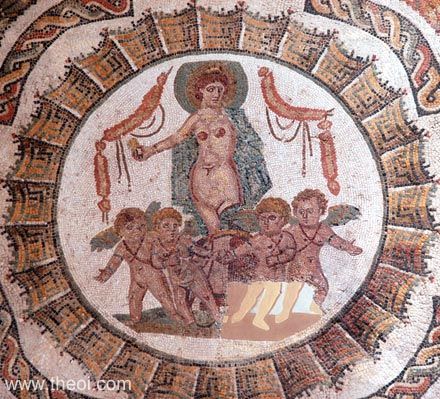
I. THE EROTES: EROS, HIMEROS & POTHOS
Eros (Love) and Himeros (Desire) were the companions of Aphrodite from her birth. Some say, Aphrodite was born pregnant with the pair.
Hesiod, Theogony 176 ff (trans. Evelyn-White) (Greek epic C8th or 7th B.C.)
:
"Eros (Love), and comely Himeros (Desire) followed her [Aphrodite] at her birth at the first and as she
went into the assembly of the gods."
[N.B. Hesiod is possibly saying that the pair of love gods were born to the goddess at her own birth.]
The Anacreontea, Fragment 57 (trans. Campbell, Vol. Greek Lyric II) (B.C.)
:
"[Aphrodite] Roaming over the waves . . . [and at her side] on dancing dolphins ride guileful Eros and
laughing Himeros (Desire)."
Aeschylus, Suppliant Women 1038 ff (trans. Weir Smyth) (Greek tragedy C5th B.C.)
:
"And in the train of their mother [Aphrodite] are Pothos (Desire) and she to whom nothing is denied,
winning Peitho (Persuasion); and to Harmonia (Harmony) has been given a share of Aphrodite, and to the
whispering touches of the Erotes (Loves)."
Quintus Smyrnaeus, Fall of Troy 5. 70 ff (trans. Way) (Greek epic C4th A.D.)
:
"Out of the sea was rising lovely-crowned Kypris [Aphrodite], foam-blossoms still upon her hair; and round
her hovered smiling witchingly Himeros (Desire)."
Pausanias, Description of Greece 1. 43. 6 (trans. Jones) (Greek travelogue C2nd A.D.)
:
"There is also [statues in the temple of Aphrodite at Megara] Peitho (Persuasion) and another goddess whom
they name Paregoron (Consoler), works of Praxiteles. By Skopas are Eros (Love) and Himeros (Desire) and Pothos
(Yearning), if indeed their functions are as different as their names."
Nonnus, Dionysiaca 33. 112 ff (trans. Rouse) (Greek epic C5th A.D.) :
"Her [Aphrodite's] attendants . . . Kharis (Grace) . . . Peitho (Seduction) . . . Pothos (Sexual
Longing)."
For Eros see also:
(1) Aphrodite Mother of Eros
(2) Aphrodite, Eros & the Loves of the Gods
(3) Aphrodite, Eros & the Loves of Men
For MORE information on these godlings see EROS, HIMEROS, POTHOS
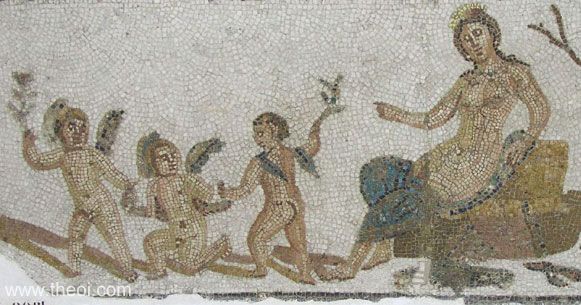
II. THE EROTES (GENERAL)
Two, three or an entire flock of winged Erotes (Loves) were depicted accompanying the goddess of love in ancient art. The Romans called them Amores or Cupides.
Pindar, Eulogies Fragment 122 (trans. Sandys) (Greek lyric C5th B.C.) :
"Aphrodite the heavenly mother of Erotes (Loves)."
Pindar, Dirges Fragment 128 :
"May I delight in the graces of Aphrodisian Erotes (Loves)."
Sappho, Fragment 194 (from Himerius, Orations) (trans. Campbell, Vol. Greek Lyric I)
(C6th B.C.) :
"Aphrodite on the Kharites' chariot with her chorus of Erotes (Loves)."
Bacchylides, Fragment 9 (trans. Campbell, Vol. Greek Lyric IV) (C5th B.C.)
:
"Golden violet-crowned Kypris [Aphrodite], to praise her, mother of the infexible Erotes."
Orphic Hymn 55 to Aphrodite (trans. Taylor) (Greek hymns C3rd B.C. to 2nd A.D.)
:
"[Aphrodite] mother of the Erotes (Loves)."
Propertius, Elegies 2. 2 (trans. Goold) (Roman elegy C1st B.C.) :
"Venus [Aphrodite] attended by a thousand tender Cupidines [Erotes], setting foot upon the sea that gave
her birth."
Valerius Flaccus, Argonautica 6. 455 ff (trans. Mozley) (Roman epic C1st A.D.)
:
"Seeks she [Hera] Venus' [Aphrodite's] bower and the garlands ever fresh that deck her abode. At the sight
of her the goddess straightway springs from her high-piled couch, and all the troop of winged Amores [Erotes the
Loves]."
Valerius Flaccus, Argonautica 7. 171 ff :
"[Venus, Aphrodite] the mother of the winged Amores (Loves)."
Statius, Silvae 1. 2. 51 (trans. Mozley) (Roman poetry C1st A.D.) :
"Once on a time, where the milky region is set in a tranquil heaven, lay kindly Venus [Aphrodite] in her
bower . . . About the posts and pillows of her couch swarm a troop of tender Amores [Erotes, Loves], begging her
make sign where she bids them bear her torches, what hearts they shall transfix; whether to wreak their cruelty
on land or sea, to set gods at variance or yet once more to vex the Thunderer [Zeus]. Herself she has yet no
purpose, no certain will of pleasure . . . Then a boy of that winged crowd, whose mouth was fieriest and whose
deft hand ne'er sent his arrow amiss, from the midst of the troop thus called to her in his sweet boyish
voice--his quivered brethren held their peace."
Apuleius, The Golden Ass 2. 8 ff (trans. Walsh) (Roman novel C2nd A.D.) :
"Venus [Aphrodite] herself, flanked by a whole choir of Gratiae [Kharites], accompanied by the entire body
of Cupides [Erotes]."
Apuleius, The Golden Ass 10. 30 ff :
"[Description of an ancient Greek play portraying the Judgement of Paris:] Each maiden representing a
goddess was accompanied by her own escort . . . Venus [Aphrodite] was surrounded by a throng of the happiest
children; you would have sworn that those little boys whose skins were smooth and milk-white were genuine
Cupides [Erotes] who had just flown in from sky or sea. They looked just he part with their tiny wings,
miniature arrows, and the rest of their get-up, as with gleaming torches they lit the way for their mistress as
though she were en route to a wedding-banquet."
Colluthus, Rape of Helen 82 ff (trans. Mair) (Greek poetry C5th to 6th A.D.)
:
"Kypris [Aphrodite] . . . saw her children the Erotes and called to them. ‘Dear children! Embrace
your mother that nursed you.’ . . . And the wandering Erotes heard the dear bidding of their mother and
hasted after their nurse."
Nonnus, Dionysiaca 13. 333 ff (trans. Rouse) (Greek epic C5th A.D.) :
"Kypris [Aphrodite] together with the Erotes (Loves) decked out a fine bed for the wedding [of
Dionysos]."
Nonnus, Dionysiaca 29. 342 ff :
"See how her [Aphrodite's] attendant Erotes (Loves) have crowned with flowers the portals of Paphos and the
building of Kypros."
Nonnus, Dionysiaca 33. 34 ff :
"[Aphrodite] O mother of the Erotes (Loves)!"
For MORE information on these godlings see EROTES
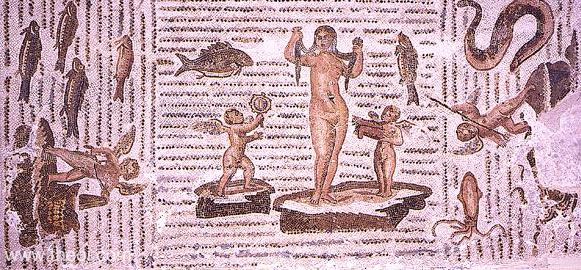
APHRODITE ATTENDANTS : HORAE
Homeric Hymn 6 to Aphrodite (trans. Evelyn-White) (Greek epic C7th to 4th B.C.)
:
"[After Aphrodite was born from the sea she was carried by the Winds to the island of Kypros :] and there
the gold-filleted Horai (Seasons) welcomed her joyously. They clothed her with heavenly garments [and jewellery]
. . . And when they had fully decked her, they brought her to the gods."
Homeric Hymn 3 to Pythian Apollo 186 ff :
"Meanwhile [as Apollon plays the lyre and the Mousai sing at the feast of the gods on Olympos] the
rich-tressed Kharites (Graces) and cheerful Horai (Seasons) dance with Harmonia (Harmony) and Hebe (Youth) and
Aphrodite, daughter of Zeus, holding each other by the wrist."
Stasinus of Cyprus or Hegesias of Aegina, Cypria Fragment 6 (from Athenaeus 15.682)
(trans. Evelyn-White) (Greek epic C7th or 6th B.C.) :
"She [Aphrodite] clothed herself with garments which the Kharites (Graces) and Horai (Hours) had made for
her and dyed in flowers of spring--such flowers as the Horai wear . . . Then laughter-loving Aphrodite and her
handmaidens wove sweet-smelling crowns of flowers of the earth and put them upon their heads--the bright-coiffed
goddesses, the Nymphai and Kharites (Graces), and golden Aphrodite too, while they sang sweetly on the mount of
many-fountained Ida."
Ibycus, Fragment 288 (trans. Campbell, Vol. Greek Lyric III) (Greek lyric C6th B.C.)
:
"Offshoot of the blue-eyed Kharites (Graces), darling of the lovely-haired Horai (Seasons), Kypris
[Aphrodite] and soft-lidded Peitho (Persuasion) nursed you among rose-blossoms."
Apuleius, The Golden Ass 10. 30 ff (trans. Walsh) (Roman novel C2nd A.D.) :
"[Description of an ancient Greek play portraying the Judgement of Paris :] Each maiden representing a
goddess was accompanied by her own escort ... Venus [Aphrodite] was surrounded by . . . charming children,
unmarried girls, representing on one side the Gratiae [Kharites] at their most graceful, and on the other the
Horae [Horai] in all their beauty. They were appeasing the goddess by strewing wreaths and single blossoms
before her, and they formed a most elegant chorus-line as they sought to please the Mistress of pleasures with
the foliage of spring."
Nonnus, Dionysiaca 3. 380 ff (trans. Rouse) (Greek epic C5th A.D.) :
"The childbed Horai (Seasons) had just delivered her [Aphrodite's] baby [Harmonia] still wet, when her
breasts were tight and swollen with the gushing white sap."
Nonnus, Dionysiaca 41. 155 ff :
"The four Horai (Seasons) struck up a tune together, when Aphrodite brought forth her wonderful daughter
[Beroe]."
Suidas s.v. Diallage (trans. Suda On Line) (Byzantine Greek lexicon C10th A.D.)
:
"‘O Eirene (Peace) brought up together with the beautiful Aphrodite and the beloved Kharites
(Graces)!’ Since weddings and festivals are held in an occasion of peace. Or because [peace] is most sweet
and pleasing."
For MORE information on these goddesses see HORAI
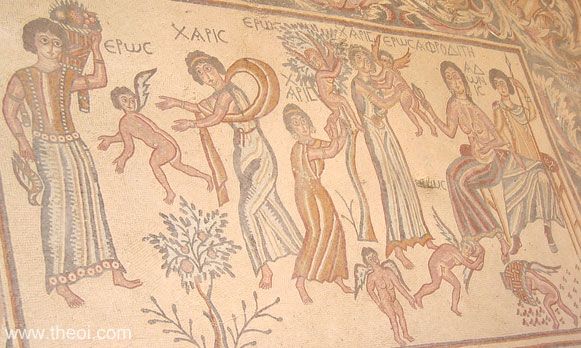
APHRODITE ATTENDANTS : CHARITES
The three elder Kharites--Aglaia (Beauty), Euphrosyne (Merriment) and Thalia (Good Cheer)--were the handmaidens
of Aphrodite.
The younger Kharites--Paidia (Play), Eudaimonia (Happiness), Pandaisia (Banquets), Pannyakhis (Parties and Night
Revels), Antheia (Floral Decorations), Harmonia (Harmony) and others--were frequently depicted as attendants of
the goddess in Greek vase painting.
Homer, Iliad 5. 337 ff (trans. Lattimore) (Greek epic C8th B.C.) :
"The immortal robe that the very Kharites (Graces) had woven for her [Aphrodite]."
Homer, Odyssey 18. 193 ff (trans. Shewring) (Greek epic C8th B.C.) :
"The fragrant balm that Kytherea [Aphrodite] puts on when she enters the bewitching circle of dancing
Kharites (Graces)."
Homeric Hymn 5 to Aphrodite 58 ff (trans. Evelyn-White) (Greek epic C7th to 4th B.C.)
:
"She [Aphrodite] went to Kypros, to Paphos, where her precinct is and fragrant altar, and passed into her
sweet-smelling temple. There she went in and put to the glittering doors, and there the Kharites (Graces) bathed
her with heavenly oil . . . filled with fragrance."
Homeric Hymn 3 to Pythian Apollo 186 ff :
"Meanwhile [as Apollon plays the lyre and the Mousai sing at the feast of the gods on Olympos] the
rich-tressed Kharites (Graces) and cheerful Horai (Seasons) dance with Harmonia (Harmony) and Hebe (Youth) and
Aphrodite, daughter of Zeus, holding each other by the wrist."
Stasinus of Cyprus or Hegesias of Aegina, Cypria Fragment 6 (from Athenaeus 15. 682)
(trans. Evelyn-White) (Greek epic C7th or 6th B.C.) :
"She [Aphrodite] clothed herself with garments which the Kharites (Graces) and Horai (Hours) had made for
her and dyed in flowers of spring . . . Then laughter-loving Aphrodite and her handmaidens wove sweet-smelling
crowns of flowers of the earth and put them upon their heads--the bright-coiffed goddesses, the Nymphai and
Kharites (Graces), and golden Aphrodite too, while they sang sweetly on the mount of many-fountained Ida."
Sappho, Fragment 194 (from Himerius, Orations) (trans. Campbell, Vol. Greek Lyric I)
(C6th B.C.) :
"Aphrodite on the Kharites' (Graces') chariot with her chorus of Erotes (Loves)."
Ibycus, Fragment 288 (trans. Campbell, Vol. Greek Lyric III) (Greek lyric C6th B.C.)
:
"Offshoot of the blue-eyed Kharites (Graces), darling of the lovely-haired Horai (Seasons), Kypris
[Aphrodite] and soft-lidded Peitho (Persuasion) nursed you among rose-blossoms."
Pausanias, Description of Greece 6. 24. 7 (trans. Jones) (Greek travelogue C2nd A.D.)
:
"The Kharites (Graces) are of all deities the nearest related to Aphrodite."
Apuleius, The Golden Ass 2. 8 ff (trans. Walsh) (Roman novel C2nd A.D.) :
"Venus [Aphrodite] herself, flanked by a whole choir of Gratiae [Kharites], accompanied by the entire body
of Cupides [Erotes]."
Apuleius, The Golden Ass 10. 30 ff :
"[Description of an ancient Greek play portraying the Judgement of Paris :] Each maiden representing a
goddess was accompanied by her own escort . . . Venus [Aphrodite] was surrounded by . . . charming children,
unmarried girls, representing on one side the Gratiae [Kharites] at their most graceful, and on the other the
Horae [Horai] in all their beauty. They were appeasing the goddess by strewing wreaths and single blossoms
before her, and they formed a most elegant chorus-line as they sought to please the Mistress of pleasures with
the foliage of spring."
Nonnus, Dionysiaca 3. 110 ff (trans. Rouse) (Greek epic C5th A.D.) :
"The soil of Byblos where the Kharites(Graces) have their home, where Assyrian Kythereia [Aphrodite]
dances."
Nonnus, Dionysiaca 24. 261 ff :
"The dancers of Orkhomenos [the Kharites] who were attendants upon Paphia [Aphrodite] had no dancing then
to do [when Aphrodite entered a contest against Athena in weaving]; but Pasithea made the spindle run round,
Peitho dressed the wool, Aglaia gave thread and yarn to her mistress."
Nonnus, Dionysiaca 31. 203 ff :
"Assyrian Aphrodite seated in a solitary spot upon Libanos [Lebanon], alone, for the Kharites, those
dancers of Orkhomenos, had been sent away to gather the various flowers of spring in the gardens."
Nonnus, Dionysiaca 33. 4 ff :
"Sweetsmiling Aphrodite put off the wonted laugh from her radiant rosy face, and told her messenger Aglaia
[one of Kharites] to call Eros her son, that swift airy flyer . . . The Kharis moved her footsteps, and turned
her face this way over earth and sea and sky, if somewhere she might find the restless track of Eros."
Nonnus, Dionysiaca 33. 112 ff :
"Her [Aphrodite's] attendants . . . Kharis (Grace) . . . Peitho (Seduction) . . . [and] Pothos (Sexual
Longing)."
Nonnus, Dionysiaca 41. 6 ff :
"[At Paphos were] Adonis and Kythereia [Aphrodite]. There were also a troop of Kharites (Graces)."
Nonnus, Dionysiaca 41. 212 ff :
"The dancing maidens of Orkhomenos [the Kharites], handmaids of Paphia [Aphrodite], drew from the horsehoof
fountain of imagination [Hippokrene], dear to the nine Mousai (Muses), delicate water to wash her [Aphrodite's
baby daughter Beroe]."
Suidas s.v. Diallage (trans. Suda On Line) (Byzantine Greek lexicon C10th A.D.)
:
"‘O Eirene (Peace) brought up together with the beautiful Aphrodite and the beloved Kharites
(Graces)!’ Since weddings and festivals are held in an occasion of peace. Or because [peace] is most sweet
and pleasing."
For MORE information on these goddesses see KHARITES
APHRODITE ATTENDANTS : PEITHO
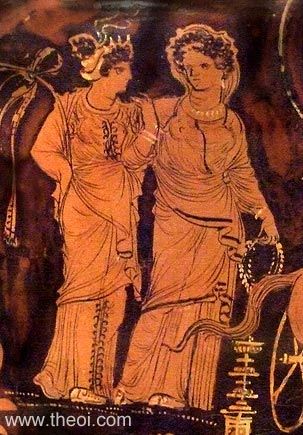
Sappho, Fragment 96 (trans. Campbell, Vol. Greek Lyric I) (C6th B.C.) :
"Nursling of Kytherea [Aphrodite], but elsewhere she [Sappho] calls Peitho a daughter of Aphrodite."
Sappho, Fragment 200 :
"Sappho says Peitho, was the daughter of Aphrodite."
Ibycus, Fragment 288 (trans. Campbell, Vol. Greek Lyric III) (Greek lyric C6th B.C.)
:
"Kypria [Aphrodite] and soft-lidded Peitho nursed you among rose-blossoms [that is, they bestowed their
gifts of beauty and grace]."
Pindar, Nemean Ode 8 Str1 (trans. Conway) (Greek lyric C5th B.C.) :
"O sovereign Peitho, herald of Aphrodite."
Aeschylus, Prometheus Bound 1038 ff (trans. Weir Smyth) (Greek tragedy C5th B.C.)
:
"And in the train of their mother [Aphrodite] are Pothos (Desire) and she to whom nothing is denied,
winning Peitho (Persuasion)."
Pausanias, Description of Greece 1. 43. 6 (trans. Jones) (Greek travelogue C2nd A.D.)
:
"[In the temple of Aphrodite at Megara:] There is also [a statue of] Peitho (Persuasion) and another
goddess whom they name Paregoron (Consoler), works of Praxiteles."
Pausanias, Description of Greece 5. 11. 8 :
"[Images on the throne in the temple of Zeus at Olympia :] Aphrodite as she rises from the sea is being
crowned by Peitho."
Colluthus, Rape of Helen 28 ff (trans. Mair) (Greek poetry C5th to 6th A.D.)
:
"[Aphrodite came to the wedding of Thetis and with her:] came also Peitho (Persuasion), having fashioned a
bridal wreath, carrying the quiver of archer Eros."
Nonnus, Dionysiaca 33. 112 ff (trans. Rouse) (Greek epic C5th A.D.) :
"Her [Aphrodite's] attendants . . . Kharis (Grace) . . . Peitho (Seduction) . . . [and] Pothos (Sexual
Longing)."
For MORE information on this goddess see PEITHO
APHRODITE ATTENDANTS : PAREGOROS
Pausanias, Description of Greece 1. 43. 6 (trans. Jones) (Greek travelogue C2nd A.D.)
:
"[In the temple of Aphrodite at Megara :] There is also [a statue of] Peitho (Persuasion) and another
goddess whom they name Paregoros (Consoler), works of Praxiteles."
For MORE information on this goddess see PAREGOROS
APHRODITE ATTENDANTS : NYMPHS
Homeric Hymn 5 to Aphrodite 254 ff (trans. Evelyn-White) (Greek epic C7th to 4th
B.C.) :
"[Aphrodite addresses Ankhises :] ‘As for the child [Aeneas], as soon as he sees the light of the
sun, the deep-breasted mountain Nymphai (Nymphs) who inhabit this great and holy mountain shall bring him up . .
. These Nymphai shall keep my son with them and rear him, and as soon as he is come to lovely boyhood, the
goddesses will bring him here to you and show you your child.’"
Stasinus of Cyprus or Hegesias of Aegina, Cypria Fragment 6 (from Athenaeus 15. 682)
(trans. Evelyn-White) (Greek epic C7th or 6th B.C.) :
"Laughter-loving Aphrodite and her handmaidens wove sweet-smelling crowns of flowers of the earth and put
them upon their heads--the bright-coiffed goddesses, the Nymphai and Kharites (Graces), and golden Aphrodite
too, while they sang sweetly on the mount of many-fountained Ida."
Ananacreon, Fragment 35 (trans. Campbell, Vol. Greek Lyric II) (Greek lyric C6th
B.C.) :
"Lord [Dionysos], with whom Eros the subduer and the blue-eyed Nymphai, and radiant Aphrodite play, as you
haunt the lofty mountain peaks."
Orphic Hymn 55 to Aphrodite (trans. Taylor) (Greek hymns C3rd B.C. to 2nd A.D.)
:
"Beauteous Nymphai with eyes cerulean bright, pleased by the sandy banks renowned of old, to drive thy
[Aphrodite's] rapid two-yoked car of gold; or if in Kypros thy famed mother fair, where Nymphai unmarried praise
thee every year, the loveliest Nymphai, who in the chorus join, Adonis pure to sing, and thee divine."
Philostratus the Elder, Imagines 1. 6 (trans. Fairbanks) (Greek rhetorician C3rd
A.D.) :
"[Description of an ancient Greek painting :] Be sure that Aphrodite is there [in the apple-orchard of the
Nymphai], where the Nymphai, I doubt not, have established a shrine to her, because she has made them mothers of
Erotes and therefore blest in their children."
Ovid, Metamorphoses 4. 288 ff (trans. Melville) (Roman epic C1st B.C. to C1st A.D.)
:
"To Mercurius [Hermes], runs the tale, and Cythereia [Aphrodite] a boy was born whom in Mount Ida's caves
the Naides nurtured . . . When thrice five years had passed, the youth forsook Ida, his fostering home, his
mountain haunts."
APHRODITE ATTENDANTS : GENETYLLIS
Suidas s.v. Genetyllides (trans. Suda On Line) (Byzantine Greek lexicon C10th A.D.)
:
"Genetyllis : A Daimon (spirit) associated with Aphrodite, responsible for procreation, taking its name
from the procreation (genesis) of children."
For MORE information on this goddess see EILEITHYIA
APHRODITE ATTENDANTS : SEA-GODS
Sea-gods, such as the Ikhthyokentauroi (Sea-Centaurs) or Tritones, were often depicted bringing Aphrodite ashore in a cockle-shell at her birth.
Apuleius, The Golden Ass 4. 31 ff (trans. Walsh) (Roman novel C2nd A.D.) :
"Then she [Venus-Aphrodite] made for the nearest shore lapped by the waves. With rosy feet she mounted the
surface of the rippling waters, and lo and behold, the bright surface of the sea-depths was becalmed. At her
first intimation, her retinue in the deep performed her wishes, so promptly indeed that she seemed to have
issued instructions long before. Nereus' daughters appeared in singing chorus, and shaggy Portunus sporting his
blue-green beard, and Salacia [Amphitrite], the folds of her garment sagging with fish, and Palaemon, the little
charioteer on his dolphin. Bands of Tritoni sported here and there on the waters, one softly blowing on his
echoing shell, another fending off with silk parasol the heat of the hostile sun, a third holding a mirror
before his mistress's face, while others, yoked in pairs to her chariot, swam below. This was the host of Venus'
companions as she made for the Oceanus."
For MORE information on her marine companions see IKHTHYES and IKHTHYOKENTAUROI
SOURCES
GREEK
- Homer, The Iliad - Greek Epic C8th B.C.
- Homer, The Odyssey - Greek Epic C8th B.C.
- Hesiod, Theogony - Greek Epic C8th - 7th B.C.
- The Homeric Hymns - Greek Epic C8th - 4th B.C.
- Pindar, Odes - Greek Lyric C5th B.C.
- Pindar, Fragments - Greek Lyric C5th B.C.
- Greek Lyric I Sappho, Fragments - Greek Lyric C6th B.C.
- Greek Lyric II Anacreon, Fragments - Greek Lyric C6th B.C.
- Greek Lyric II Anacreontea, Fragments - Greek Lyric C5th - 4th B.C.
- Greek Lyric III Ibycus, Fragments - Greek Lyric C6th B.C.
- Greek Lyric IV Bacchylides, Fragments - Greek Lyric C5th B.C.
- Aeschylus, Suppliant Women - Greek Tragedy C5th B.C.
- Pausanias, Description of Greece - Greek Travelogue C2nd A.D.
- The Orphic Hymns - Greek Hymns C3rd B.C. - C2nd A.D.
- Philostratus the Elder, Imagines - Greek Rhetoric C3rd A.D.
- Quintus Smyrnaeus, Fall of Troy - Greek Epic C4th A.D.
- Nonnus, Dionysiaca - Greek Epic C5th A.D.
- Colluthus, The Rape of Helen - Greek Epic C5th - 6th A.D.
ROMAN
- Ovid, Metamorphoses - Latin Epic C1st B.C. - C1st A.D.
- Propertius, Elegies - Latin Elegy C1st B.C.
- Valerius Flaccus, The Argonautica - Latin Epic C1st A.D.
- Statius, Silvae - Latin Poetry C1st A.D.
- Apuleius, The Golden Ass - Latin Novel C2nd A.D.
BYZANTINE
- Suidas, The Suda - Byzantine Greek Lexicon C10th A.D.
BIBLIOGRAPHY
A complete bibliography of the translations quoted on this page.